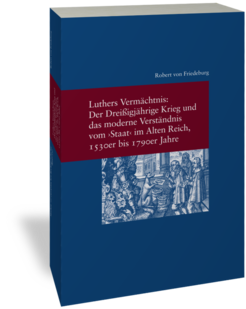Luthers Vermächtnis: Der Dreißigjährige Krieg und das moderne Verständnis vom ›Staat‹ im Alten Reich, 1530er bis 1790er Jahre
Robert von Friedeburg
Studien zur europäischen Rechtsgeschichte 320
Frankfurt am Main: Klostermann 2021, 560 p.
ISSN 1610-6040
ISBN 978-3-465-04369-0

The concept of ‘state’ that developed in the early modern German-speaking Reich was not based on the model of the Holy Roman Empire, nor was it understood to describe the consolidation of princely power over land and people. Instead, it emerged in the context of conflicts between princes and estates in the aftermath of the devastation of the Thirty Years’ War. Taking up the contemporary polemics against criminal princes dating back to Luther, Veit Ludwig von Seckendorff in his Teutscher Fürstenstaat (1656) conceived of a ‘German princely state’ as a unit of land, people and laws that allegedly reached far back into the Middle Ages. The legal system and lawful administration (Policey) of this particular type of territorial state were to protect its inhabitants from the incompetence and wickedness of princes. From the late 17th century onward, these ideas, the development of which the book traces on the basis of a broad range of sources, increasingly found favour also with many princes and their advisors in both Protestant and Catholic German states.
